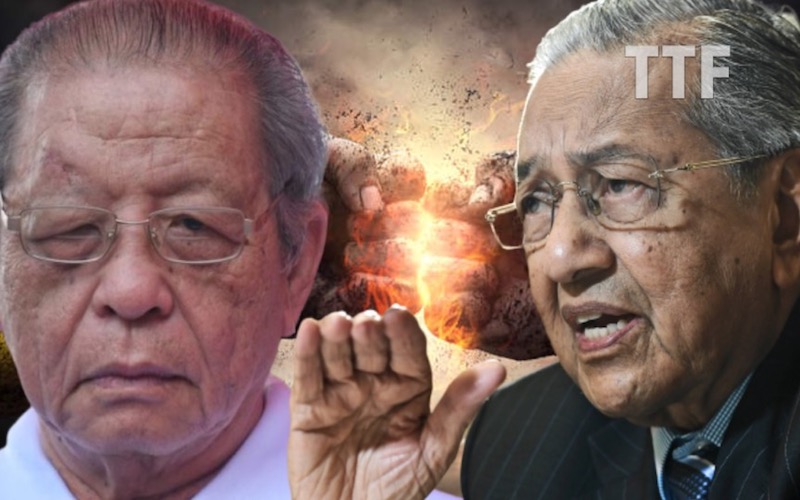Mahathir himself abused Facebook and Twitter to effect negative change

Prior to the 14thgeneral election, leaders of the Pakatan Harapan ruling coalition, then members of the opposition, took to Facebook, Twitter and several other internet based platforms to wage vicious disinformation and fake news campaigns supported by key media representatives from abroad.
Tun Dr Mahathir Mohamad himself took to Facebook and blogging with preposterous claims bordering on sedition, including the one about the Yang di-Pertuan Agong being placed under house arrest by the then premier, Dato’ Seri Najib Tun Razak.
So it serves no purpose for him to call on Facebook to collaborate with the government and law enforcement agencies to ensure that social media continues to generate positive change instead of creating negative ones.
If anything, its people like Mahathir and Lim Kit Siang who brought rot to the country through the dissemination of fake news and disinformation via Facebook, Twitter, Instagram, WhatsApp and We Chat.

SRI HARTAMAS: A new study on the impact social media has on politics may help shed light on the average internet user’s reliance on Facebook as a major source of political news.
The study, authored by an R Kelly Garett of the Ohio State University’s School of Communication, surveyed several hundred people at three points between 2012 and 2016 to assess how social media use impacted a person’s willingness to believe false political information.
While focused on the American audience, the results of the study nonetheless serve as indicators to global trends in democracies with high internet use, Malaysia included.
In light of this, let us go ahead and take the curious case of Pakatan Harapan as a point in contention to demonstrate just how the Malaysian sensibility was tampered with.
Prior to the 14thgeneral election, leaders of the ruling coalition, then members of the Malaysian opposition, took to Facebook, Twitter and several other internet based platforms to wage vicious disinformation and fake news campaigns supported by key media representatives from abroad.
Tun Dr Mahathir Mohamad himself took to Facebook and blogging with preposterous claims bordering on sedition, including the one about the Yang di-Pertuan Agong being placed under house arrest by the then premier, Dato’ Seri Najib Tun Razak.
At one point, he even suggested that his private jet had been sabotaged by people associated with the Najib administration to finish him off before the general election.
Mahathir repeatedly wrote of the people’s power, encouraged mass-scaled street protests to denounce Barisan Nasional and urged Malaysians to bring an end to Najib’s premiership so that Pakatan Harapan could take over and try the latter in the court of law.
Najib was said to have flexed his political muscle to castrate all those who attempted to do him in, including former Attorney-General Tan Sri Abdul Gani Patail, former deputy premier turned PPBM president Tan Sri Muhyiddin Yassin, and later, MACC chief Tan Sri Abu Kassim Mohamed.
Mahathir alleged that Gani had a charge sheet that proved Najib’s involvement in a conspiracy to siphon RM2.6 billion into his personal account and insisted that the document could be reproduced the minute Pakatan took over.
It’s been one year and nineteen days since that happened, and yet, nobody has seen, let alone heard of the charge sheet.
We have, however, heard prosecution witnesses from the bank in which Najib opened an account confess that the RM2.6 billion was from the Saudi Royal household as repeatedly stated by Najib himself over a period of three years.
In 2015, it was established that the charge sheet Gani allegedly prepared was in fact fabricated by him together with Abu Kassim and that the Wall Street Journal and Clare Rewcastle Brown, Mahathir’s hand in media, were all in with Gani on the conspiracy (read full story via link below).
However, due to the head start the DAP had in Facebook and online media campaigning, the internet was flooded with disinformation and fake news emanating from pro DAP channels that convinced Malaysians the RM2.6 billion was money stolen from 1MDB.
The campaign was so fierce that no amount of truth poured into the cyber world did anybody any good.
Mahathir jumped onto the DAP bandwagon in 2016 and ridiculed the notion that Arab countries were willing to donate billions despite knowing that such donations were the norm, not the anomaly.
In 2017, he accused Najib of selling the country to China following the government’s decision to formalise a pact between DRB-Hicom Bhd and Zhejiang Geely Holdings Groupthat saw the latter acquiring a 49.9% stake in the national car manufacturer for RM460.3mil.
However, after taking over as Prime Minister, Mahathir did an about turn by expressing hope that the strategic partnership between Proton and Geely would accelerate the process of improving Proton cars and even witnessed the re-signing of commitments between the two car manufacturers.
The damage was done.
People were so convinced that Najib did try and sell the country to China that it gave Mahathir room to renegotiate several other deals with the People’s Republic, including those associated with the East Coast Rail-Link (ECRL) project.
The renegotiation of the ECRL project literally saw Malaysia granting China Communications Construction Company Ltd (CCCC) an effective 50 per cent stake in the project.
As if that weren’t enough, Mahathir generously thew in several thousand acres of land that came with exclusive development rights, translating into billions in potential earnings over the next ten or so years for China.
But he no longer calls it “selling the country to China,” but entering “strategic partnerships” for the benefit of the rakyat.
You don’t see Pakatan supporters taking Mahathir to task for this or for misrepresenting their trust, faith and intelligence.
Perhaps its time the government conducts its own study to discover why this is and how social media use impacts the average Malaysian’s willingness to believe fake news.
However, one should not expect findings to be revealed as the study does have the potential of destroying both Mahathir’s and Kit Siang’s credibility.
Given that the likelihood of us being served with such information by the government of the day is next to nil, it serves no purpose for that government to call on Facebook to collaborate with the government and law enforcement agencies to ensure that social media continues to generate positive change instead of creating negative ones.
If anything, its people like Mahathir and Lim Kit Siang who brought rot to the country through the dissemination of fake news and disinformation via Facebook, Twitter, Instagram, WhatsApp and We Chat.



No comments:
Post a Comment